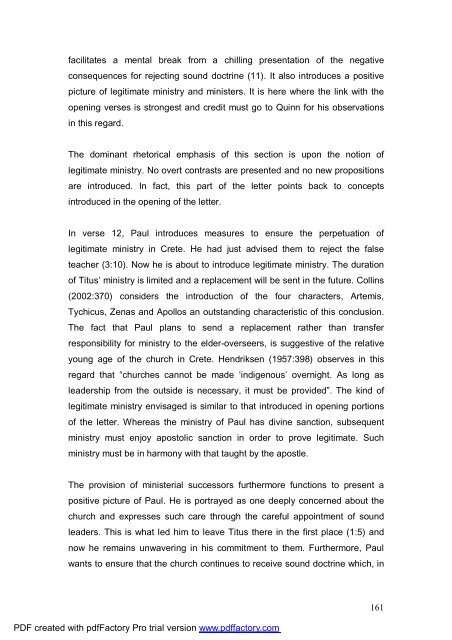A Text centred rhetorical analysis of Paul's Letter to Titus
A Text centred rhetorical analysis of Paul's Letter to Titus
A Text centred rhetorical analysis of Paul's Letter to Titus
You also want an ePaper? Increase the reach of your titles
YUMPU automatically turns print PDFs into web optimized ePapers that Google loves.
facilitates a mental break from a chilling presentation <strong>of</strong> the negative<br />
consequences for rejecting sound doctrine (11). It also introduces a positive<br />
picture <strong>of</strong> legitimate ministry and ministers. It is here where the link with the<br />
opening verses is strongest and credit must go <strong>to</strong> Quinn for his observations<br />
in this regard.<br />
The dominant <strong>rhe<strong>to</strong>rical</strong> emphasis <strong>of</strong> this section is upon the notion <strong>of</strong><br />
legitimate ministry. No overt contrasts are presented and no new propositions<br />
are introduced. In fact, this part <strong>of</strong> the letter points back <strong>to</strong> concepts<br />
introduced in the opening <strong>of</strong> the letter.<br />
In verse 12, Paul introduces measures <strong>to</strong> ensure the perpetuation <strong>of</strong><br />
legitimate ministry in Crete. He had just advised them <strong>to</strong> reject the false<br />
teacher (3:10). Now he is about <strong>to</strong> introduce legitimate ministry. The duration<br />
<strong>of</strong> <strong>Titus</strong>’ ministry is limited and a replacement will be sent in the future. Collins<br />
(2002:370) considers the introduction <strong>of</strong> the four characters, Artemis,<br />
Tychicus, Zenas and Apollos an outstanding characteristic <strong>of</strong> this conclusion.<br />
The fact that Paul plans <strong>to</strong> send a replacement rather than transfer<br />
responsibility for ministry <strong>to</strong> the elder-overseers, is suggestive <strong>of</strong> the relative<br />
young age <strong>of</strong> the church in Crete. Hendriksen (1957:398) observes in this<br />
regard that “churches cannot be made ‘indigenous’ overnight. As long as<br />
leadership from the outside is necessary, it must be provided”. The kind <strong>of</strong><br />
legitimate ministry envisaged is similar <strong>to</strong> that introduced in opening portions<br />
<strong>of</strong> the letter. Whereas the ministry <strong>of</strong> Paul has divine sanction, subsequent<br />
ministry must enjoy apos<strong>to</strong>lic sanction in order <strong>to</strong> prove legitimate. Such<br />
ministry must be in harmony with that taught by the apostle.<br />
The provision <strong>of</strong> ministerial successors furthermore functions <strong>to</strong> present a<br />
positive picture <strong>of</strong> Paul. He is portrayed as one deeply concerned about the<br />
church and expresses such care through the careful appointment <strong>of</strong> sound<br />
leaders. This is what led him <strong>to</strong> leave <strong>Titus</strong> there in the first place (1:5) and<br />
now he remains unwavering in his commitment <strong>to</strong> them. Furthermore, Paul<br />
wants <strong>to</strong> ensure that the church continues <strong>to</strong> receive sound doctrine which, in<br />
PDF created with pdfFac<strong>to</strong>ry Pro trial version www.pdffac<strong>to</strong>ry.com<br />
161

















